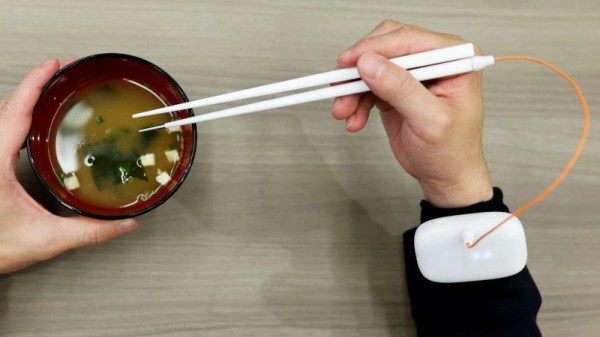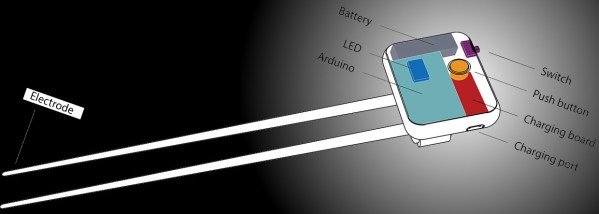“It was the best of times, it was the blurst of times?” Perhaps not anymore, if this Ig Nobel-worthy analysis of the infinite monkey theorem is to be believed. For the uninitiated, the idea is that if you had an infinite number of monkeys randomly typing on an infinite number of keyboards, eventually the complete works of Shakespeare or some other famous writer would appear. It’s always been meant to be taken figuratively as a demonstration of the power of time and randomness, but some people just can’t leave well enough alone. The research, which we hope was undertaken with tongue firmly planted in cheek, reveals that it would take longer than the amount of time left before the heat death of the universe for either a single monkey or even all 200,000 chimpanzees in the world today to type the 884,647 words of Shakespeare’s complete works in the proper order.
chopsticks3 Articles
Electric Chopsticks Bring The Salt, Not The Pain
The Japanese people love their salt, perhaps as much as Americans love their sugar high fructose corn syrup and caffeine. But none of these are particularly good for you. Although humans do need some salt in their diets to continue existing, the average Japanese person may be eating too much of it on a regular basis — twice the amount recommended by the World Health Organization, according to Reuters. Cue the invention of electric chopsticks, which provide salty flavor without the actual sodium.
No, you won’t get shocked — not even a fresh 9 V to the tongue’s worth. The tips of the chopsticks are made of something food-safe and conductive, and one is wired to a bracelet that contains a small computer. Using a weak current, the chopsticks transmit sodium ions from the food to the tongue, which increases the perceived saltiness by 1.5x. The device was co-created by a Meiji University professor and a Japanese beverage maker, who hope to commercialize it sometime next year.
This isn’t the first time humans have used trickery when it comes to diets. The older among you may remember the miracle berry weight loss craze of the 1970s. When ingested first, miracle berries make sour things taste sweet, so chowing down on grapefruits and lemons suddenly sounds like a good idea. What people failed to realize was that the acidity would still wreak havoc on their teeth and tongues, leaving them regretful the next day.
Images via Reuters
Digital Dining With Charged Chopsticks
You step out of the audience onto a stage, and a hypnotist hands you a potato chip. The chip is salty and crunchy and you are convinced the chip is genuine. Now, replace the ordinary potato chip with a low-sodium version and replace the hypnotist with an Arduino. [Nimesha Ranasinghe] at the University of Maine’s Multisensory Interactive Media Lab wants to trick people into eating food with less salt by telling our tongues that we taste more salt than the recipe calls for with the help of electrical pulses controlled by everyone’s (least) favorite microcontroller.
Eating Cheetos with chopsticks is a famous lifehack but eating unsalted popcorn could join the list if these chopsticks take hold and people want to reduce their blood pressure. Salt is a flavor enhancer, so in a way, this approach can supplement any savory dish.
Smelling is another popular machine hack in the kitchen, and naturally, touch is popular beyond phone screens. You have probably heard some good audio hacks here, and we are always seeing fascination stuff with video.













